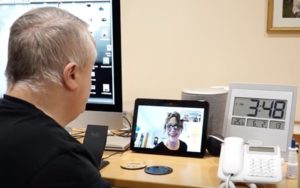Protecting Your Mental Health If You Are Self Isolating
The World Health Organisation (WHO) and public health authorities around the world are taking action to contain the COVID-19 outbreak. However, this time of crisis is generating stress in the population.
Here are some considerations to support mental and psychological well-being during COVID-19 outbreak.

Limit your news intake
Avoid watching, reading or listening to news that causes you to feel anxious or distressed; seek information mainly to take practical steps to prepare your plans and protect yourself and loved ones. Seek information updates at specific times during the day once or twice. The sudden and near-constant stream of news reports about an outbreak can cause anyone to feel worried. Get the facts.
Gather information at regular intervals, from WHO website and local health authorities’ platforms, in order to help you distinguish facts from rumours.
Do stay connected to people
Just because you’re self-isolating, doesn’t mean you have to cut yourself off altogether. You can stay connected via email, social media, video conference and telephone.
If you feel that you’re beginning to struggle, take some time to call a friend or family member to talk about how you’re feeling.
If you don’t have anyone you can speak to please contact the Trust on 01480 474074 (available 9am-5pm weekdays) or consider arranging a call from a beneficiary volunteer, a friendly voice at the end of the phone who can empathise with your situation.

Join the online events being run by beneficiaries in the Positively Connected group and keep in touch with other beneficiaries.
Other emotional support lines available include the Samaritans (call free on 116 123) and SANEline (4.30pm to 10.30pm on 0300 304 7000).
Maintain a sense of routine
Even though health authorities have recommended limiting your physical social contact to contain the outbreak try as much as possible to keep your personal daily routines. Wake up and go to bed at healthy times to ensure you get enough sleep.
Find some time to have value to your day, life cannot be just eating and sleeping. Do something fun for yourself (that isn’t just Netflix).
Many people who are self isolating are using time for self-reflection and picking apart everything that is wrong with their life. This is unhealthy and it is very common to experience massive life dissatisfaction as a result. Getting into a constant flow of critiquing your life and yourself can lead to negative cognitive spirals.
It will help to try and see this as a different period of time in your life, and not necessarily a bad one, even if you didn’t choose it. It will mean a different rhythm of life, a chance to be in touch with others in different ways than usual.
Remember the useful phrase ‘this too shall pass’.
Do keep a healthy diet
When you’re at home it can be tempting to just sit still on the sofa, eating unbalanced meals and snacking all day as a way to entertain yourself.
Do your best to eat well. If you haven’t got people who can bring food to you then see if you can sign up to home deliveries from your local supermarket.
There may be community support groups in your local area that can provide support with shopping if you are not able.
Take a look at our Food and Nutrition information for inspiration.

Engage with nature
 Our physical health and mental health are linked so try to create a routine that includes some physical exercise if possible. Although you can’t spend time with others make the most of any private outdoor space you have – such as a garden or balcony – if you have one, as being in nature can also help our wellbeing.
Our physical health and mental health are linked so try to create a routine that includes some physical exercise if possible. Although you can’t spend time with others make the most of any private outdoor space you have – such as a garden or balcony – if you have one, as being in nature can also help our wellbeing.
Alternatively, make sure you are exposed to some natural daylight, open the window and let fresh air into your room.
Don’t just sit in front of a screen – vary your activities
Sitting in front of a screen all day – whether for work or pleasure – is not the best way to spend long periods of time. Especially because the blue light from devices, like smartphones, can be disruptive to your sleep and overall wellbeing.
Anxiety UK, a charity that helps people suffering with anxiety, has produced a list of self-isolation activities to diversify what you do at home in the coming weeks.
It suggests: downloading podcasts, watching box sets, doing arts and crafts, trying meditation, baking new foods, learning a new hobby, skyping friends, FaceTime calls, cooking, writing, reading a book, doing DIY or gardening.
Read some suggestions and tips about how to keep yourself occupied if you are self isolating or social distancing.
If you're feeling anxious
If your anxiety is particularly heightened Anxiety UK suggest practising the APPLE technique which encourages you to Acknowledge, Pause, Pull back, Let go and Explore.
- Acknowledge – Notice and acknowledge the uncertainty as it comes to mind.
- Pause – Don’t react as you normally do. Don’t react at all. Just pause and breathe.
- Pull back – Tell yourself this is just the worry talking, and this apparent need for certainty is not helpful and not necessary. It is only a thought or feeling. Don’t believe everything you think. Thoughts are not statements or facts.
- Let go – Let go of the thought or feeling. It will pass. You don’t have to respond to them. You might imagine them floating away in a bubble or cloud.
- Explore – Explore the present moment, because right now, in this moment, all is well. Notice your breathing and the sensations of your breathing. Notice the ground beneath you. Look around and notice what you see, what you hear, what you can touch, what you can smell. Right now. Then shift your focus of attention to something else – on what you need to do, on what you were doing before you noticed the worry, or do something else – mindfully with your full attention.

